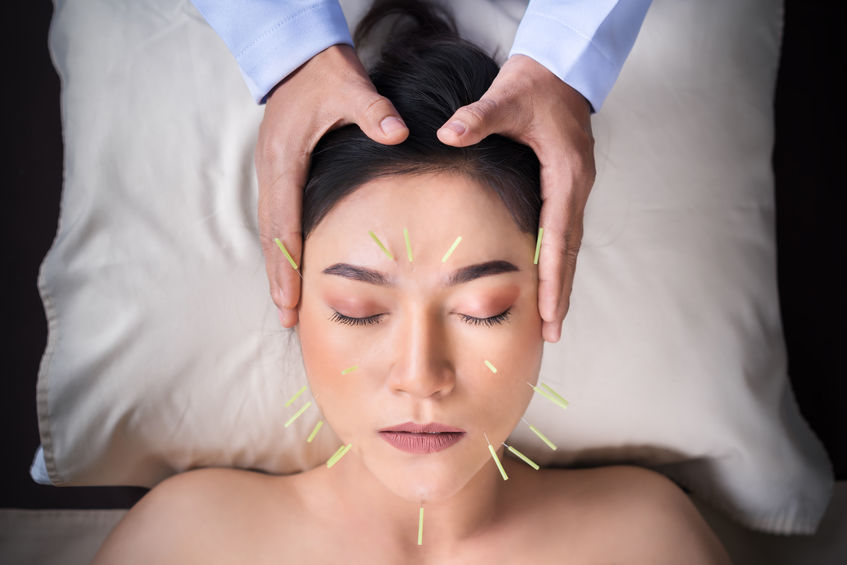WHAT IS ACUPUNCTURE ?
Acupuncture is a branch of Chinese medicine. It consists in stimulating certain points of the body, in order to restore the circulation of energy, the famous Qi. Needles are used to harmonize Yin and Yang, restore energy balance. They are placed on the various energy meridians. The insertion of the needle is most often painless.

What happens during a session ?
A prerequisite essential for any treatment, the clinical examination (or energy balance) is entirely conventional and includes an interrogation, an examination, combining inspection, palpation, auscultation, etc… It is perhaps a little more suited to a diagnosis of acupuncture. The complexion, the tongue, the eyes, the radial pulses … are « studied with a magnifying glass ».
At the end of the examination, the doctor assesses the vital energy of his patient: insufficiencies and fullness, Yin and Yang:
• The void is usually filled by point toning techniques, at the crossroads of the meridians;
• Fullness by scatter points.
On each of the meridians, there are specific points of toning or dispersion to rebalance the functioning of a particular organ.
How does acupuncture affect the body?
Depending on your energy balance, acupuncture will bite the meridian (s) in which the energy is not flowing properly and therefore which are causing your problem (s), as well as the meridian (s) complementary to this based on the balance method of Dr. Tan *. The objective is to circulate the energy again between the two points.
Sometimes when the pain travels all over the brain, or literally « takes » the whole head, the acupuncturist may have to come and stimulate the 12 meridians. To do this, we use the « 12 magic points strategy » to operate a global rebalancing of the energy system, with one needle per meridian (12 needles).
Needles that have been planted are left in place for a few minutes, longer if there are points to be toned.
Is the acupuncturist still a doctor?
In France, the acupuncturist must be a doctor. He must follow a specific training of 2 to 3 years.
Can you bring your child?
Of course, acupuncture can cure children, like their parents … with a few reservations. The needles don’t hurt, but they still bite. And by definition children move more than adults, which makes treatment less easy. Electric stimulation, of very low amplitude, is then a solution.
Is acupuncture dangerous?
No, acupuncture cannot be dangerous: if the acupuncturist does anything, the worst that can happen is that nothing happens! Indeed, if it stings a point which does not need to be, a point which is therefore not activated, in the direction of Yin or Yang, nothing will happen.
In terms of the side effects of acupuncture, a few lipothymias, small discomforts, probably fear of the idea of injections or the sight of needles, and that’s it.
Are the needles systematically sterilized ?
In Advance European Medicare Center we use always disposable needles.
Are there any incompatibilities with classical medicine? Contraindications?
Some precautions must be taken by the acupuncturist and the patient warned. Thus, if the needles can relieve angina pain, it is useful insofar as it announces a suffering of the heart muscle. This improvement in symptoms, which is purely functional, should not, however, mask them.
Likewise, acupuncture should not replace certain treatments: it alleviates the pain of cancer, but does not cure the tumor. Acupuncture is therefore not incompatible with conventional medicine, it is an additional (and complementary) tool to better treat patients.
Contraindications are therefore organic diseases. The acupuncturist can relieve the symptoms, but can do nothing for the destroyed organs.
What are the main indications?
All that is functional, which is a dysfunction, can be improved by acupuncture: allergies, eczema, depression, inflammatory joint pain, gastric problems, constipation, urinary incontinence, dental pain, childbirths and perinatal events… Acupuncture also brings a precious help to stop smoking, accompanies weight loss attempts…
Is education regulated?
Acupuncture in France is taught at the Faculty, in certain universities which issue a national diploma, known as inter-university (DIU), now recognized throughout Europe.
Source: Written by: Dr Brigitte Blond – Medical review: Dr Jesus Cardenas, Doctissimo medical director
